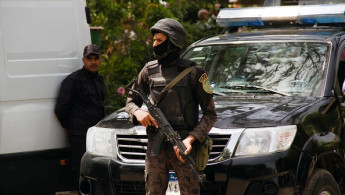Egypt arrest dozens over protest calls ahead of COP27
Egyptian security forces have arrested nearly 70 people in connection with calls for protests to coincide with the COP27 climate summit, a rights group said.
They also briefly detained an Indian activist after he set off on a protest march from Cairo.
The arrests come after some social media users, including an exiled former construction contractor and actor, Mohamed Ali, made renewed calls for anti-government protests in Egypt on Nov. 11.
The COP27 United Nations climate talks will be held in the Red Sea resort of Sharm el-Sheikh from Nov 6 to 18.
By Monday, at least 67 people had been arrested in Cairo and other cities over the previous few days and had appeared in front of state security prosecution in relation to calls for protests on Nov. 11, said Mohamed Lotfy, director of the Egyptian Commission for Rights and Freedoms (ECRF), a non-government organisation.
Some were detained on charges including spreading false news after sharing content on a Facebook page calling for demonstrations, according to ECRF.
Witnesses say there has also been an increase in spot controls in which plain clothes security officers check pedestrians' mobile phones and social media accounts.
Interior ministry spokesmen did not respond to calls and messages seeking comment. There was no immediate response to an emailed request for comment to the COP27 presidency.
On Sunday, an Indian activist, Ajit Rajagopal, was detained overnight in Cairo after setting off on a solo climate justice protest march in which he aimed to walk several hundred kilometres of the route to Sharm el-Sheikh.
Rajagopal told Reuters he was questioned for several hours about what he was doing in Egypt and why he was carrying a poster showing a description and the route of his march.
"I explained to them that I don't want to add any carbon footprint to Egypt, that is why I'm walking," he said.
Rajagopal said he was still trying to get accreditation for COP27 after being released on Monday, but did not intend to resume his march.
Public protests are effectively banned in Egypt, following a crackdown on political dissent that began with the overthrow of Muslim Brotherhood leader Mohamed Mursi in 2013 by then-army chief Abdel Fattah al-Sisi.
Sisi, who was elected president in 2014, says security measures were needed to stabilise Egypt. The crackdown swept up liberal activists as well as Islamists.
Egypt's COP27 presidency has said protests will be allowed in designated areas in Sharm el-Sheikh during the summit, but campaigners have expressed concern that their voices will be curbed.
Calls for protests over alleged official corruption by Ali, the exiled former contractor, resulted in rare demonstrations against Sisi in 2019 and a crackdown in which thousands were arrested, according to rights groups.
Some of those detainees were released this year as part of an amnesty initiative linked to a political dialogue, though rights lawyers say there have also been continuing arrests.
One of Egypt's most prominent activists, Egyptian-British citizen Alaa abd al-Fattah, was arrested during the 2019 crackdown and remains in prison more than 200 days into a hunger strike.
Abd al-Fattah will stop consuming honey, tea and milk from Tuesday and plans to stop drinking water from Nov. 6, when COP27 opens, his family says.
Earlier this year, Abd al-Fattah had been consuming a minimal quantity of calories to allow himself to sustain the strike, they say.
(Reuters)





 Follow the Middle East's top stories in English at The New Arab on Google News
Follow the Middle East's top stories in English at The New Arab on Google News


